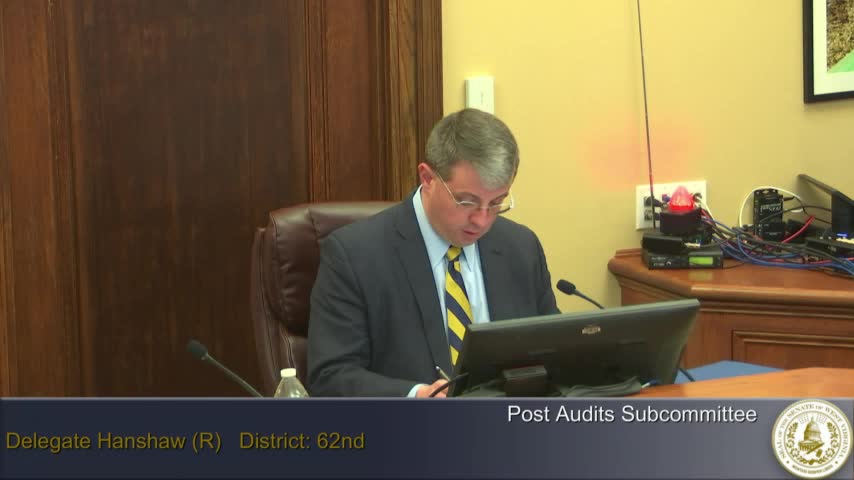Legislative Auditor: 2024 VFD audits show low error rate, some accounting problems at volunteer departments
Get AI-powered insights, summaries, and transcripts
Subscribe
Summary
A Legislative Auditor presentation to a West Virginia legislative subcommittee found that 97 volunteer fire departments were audited in 2024, identifying compliance issues totaling about $200,000 across 54 departments out of roughly $10.9 million audited; auditors said most problems stem from recordkeeping or misunderstood allowable uses.
Nathan Hamilton, VFD auditor in the Legislative Auditor’s Post Audit Division, reported to a legislative subcommittee that audits of volunteer fire departments’ state funds found a low overall rate of noncompliance but persistent recordkeeping problems.
Hamilton told the committee that 426 qualifying volunteer fire departments received about $33,600,000 in state distributions in 2024 from the Fire Protection Fund, which is funded by a surcharge and premium tax on fire and casualty insurance. The Legislative Auditor audited 97 departments, covering more than $10,900,000 in state funds, and found compliance issues in 54 of those audits, totaling about $200,000 and representing roughly 1.8% of the audited dollars.
Hamilton said the audits focus only on the departments’ state account — a bank account departments are required to create and use exclusively for state distributions — and that departments must keep itemized receipts, invoices and other documentation for five years to support use of state funds for allowable purposes. "Departments must also retain itemized receipts, invoices, and documentation for 5 years to support the use of state funds for allowable purposes," Hamilton said.
The Legislative Auditor conducts compliance audits of the state account and selects departments using a risk assessment plus a statutory requirement that each department be audited at least once every five years. Engagement letters are sent in batches of about 30 departments, roughly three times per year; those letters request a list of vehicles and property, proof of title for vehicles purchased during the audit year, documentation of loan payments and itemized receipts for each transaction from the state account.
Hamilton described three typical findings: unallowable expenditures (money spent on items not allowed by West Virginia Code), unsupported expenditures (required documentation missing), and commingled funds (mixing state funds with other sources in a single account, which is prohibited). He said five general categories of unallowable expenditures were found in 2024 audits: accident and sickness insurance, fundraising expenses, food and beverages, reimbursements for unallowable items or services, and cable television.
Hamilton noted the 2023 legislative session modified allowable expenditures in a bill referenced in the presentation, with some changes taking effect after most of the audited period. He said accident and sickness insurance is now allowable under the changed law and that food and beverage expenses "may be permissible if related to emergency response." He cautioned auditors observed that unallowable purchases often appeared unintentional and frequently resulted from misunderstanding of allowable categories or of document-retention requirements.
Audit manager Mike Jones answered questions about challenges to findings. "Since the audit process for them to challenge has started, there's maybe been a half dozen that have challenged, and 2 or 3 of them have been successful," Jones said.
Committee members asked about overlap with the State Auditor’s Office. Hamilton and Jones said the Legislative Auditor focuses on state-distributed funds held in the department’s state account, while the State Auditor’s Office performs broader agreed-upon procedures that can cover all of a department’s funds (bingo, raffle, levy, etc.). Hamilton said the offices coordinate to avoid overlapping audits and typically allow at least a year between the completion of a State Auditor review and the Legislative Auditor’s audit of the same department unless there is a specific reason to proceed sooner.
Hamilton summarized compliance results: of the 97 audits, 43 departments were fully compliant (a 15% increase over the prior year), and 54 had one or more findings. As Hamilton told the committee, the reported instances of noncompliance represented a small share of audited funds and departments are given findings letters and access to resources; if withheld state funds result from noncompliance, the Legislative Auditor communicates amounts to the State Treasurer, which withholds and redistributes funds in future quarterly distributions per West Virginia law.
Votes at a glance: The committee approved the minutes of the Nov. 12, 2024, meeting on a voice vote (motion made by the presiding officer; tally not specified). The committee also adopted a motion to adjourn on a voice vote (mover identified in the record as the presiding officer; tally not specified).
The Legislative Auditor’s full 2024 annual report, including department-level findings and recommendations, is included in the packet provided to the committee, and auditors said they will discuss specific audits with members on request.
